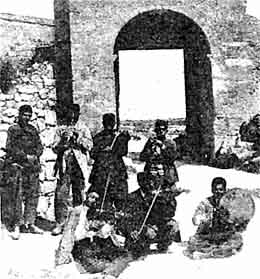
Goran Bregovic Ederlezi
All the Rroms, Dad, sacrify sheeps.
Информация о песне взята отсюда

But me, poor devil, I must stay away.
Oh yes, Mum, it's our celebration. It's our celebration, Ederlezi.
Dad, a sheep for us. All the Rroms, Mum, sacrify sheeps.
And all the Rroms, Dad, Dad, all the Rroms, Mum.
All the Rroms, dad, dad... Ederlezi, Ederlezi, all the Rroms, Mum.
...
Ederlezi iz Gypsy name for Serbian Fest of Saint George.
It's celebrated on 6th of May. Ederlezi has been a fascination of mine for some time and I have collected various tid-bits of information.
The various Balkan spellings (Herdeljez, Erdelezi) are merely variants on the Turkish Hidirellez (i's not dotted), a holiday signaling the beginning of spring, occurring approcsimately 40 days after the spring equinox. The Balkan Slavs added
the Christian layer of St. George's Day (Gjuorguovdan, Dz^urdz^ovden, Gergjuovden.
Hidrellez is a very significant day in Anatolia. The word itself is very significant;
it is the combination of names of two prophets:
Hizir & Ilyas. Hidrellez signifies a rebirth of nature and is also considered to be the beginning of summer.
According to Anatolian people's beliefs Hizir and Ilyas are two prophets who drank
the water of never-dying; they are brothers and friends. They have given each other
promise to meet on this night of May 5th every year to give rebirth to nature.
Hizir is the protector of plants; he gives life to plants. He helps poor people.
Wherever he goes, he brings abundance.
Ilyas is the protector of waters and according to some, the protector of animals.
Wherever he goes, animals become healthier.
People believe that wishes made on this night will become true.
They also believe sick people will become healthier and it will be the end of
bad-luck and misfortunes.
There are also a lot of rituals that people perform. Some people put a coin
inside a red cloth and then hang it on a rose branch. In the morning this money
is put into the wallet so that it will bring abundance. It is also believed that
if you go out, have a picnic and be in nature on this day, your days in winter will have less hardships. Most city people know this day simply as a picnic day...
Краткий пересказ английского текста
В этой песне поется о бедном цыгане, который стоит в стороне, в то время как все его сородичи приносят в жертву барашка в светлый праздник Ederlezi смешанного анатолийско-балканско-цыганского происхождения, который цыгане ассоциируют со Св. Георгием. У бедного цыгана нет барашка для жертвоприношения, и он жалуется на это своим маме и папе. Отчего праздник не делается менее светлым, будучи изначально турецким Hidirellez (i без точек), справлявшимся на сороковой день после весеннего равноденствия и посвященным пророкам Хизиру и Ильясу (это отражено в названии праздника). Хизир с Ильясом, братья и соратники, испили водицы бессмертия и решили каждый год собираться пятого мая с целью присмотреть за неизбежностью возрождения природы.
Балканцы прочитали Хизира с Ильясом по-своему: (Herdeljez, Erdelezi) и «подружили» их со Св. Георгием (Gjuorguovdan, Dz^urdz^ovden, Gergjuovden).
Кстати, крымские татары тоже справляют Хыдырлес – праздник весны.
Я был на этом празднике 5 мая этого года в Крыму у родственников.
Музыка крымских татар имеет несомненное родство с балканской.
В начале 20 века обычно кочующие цыгане играли в крымско-татарских ансамблях; скрипач был всегда непременно цыган. Полный оркестр состоял минимум из четырех человек: один или двое играли на скрипке, другой на дудке или кларнете, третий бил в бубен, а четвертый - в большой барабан.
И сейчас крымско-татарские группы с удовольствием играют болгарские хоро,
молдавскую, караимскую и кавказскую музыку, выдавая за свою (а может это и их на самом деле?)....

На фото крымско-татарский ансамбль начала 20 века.